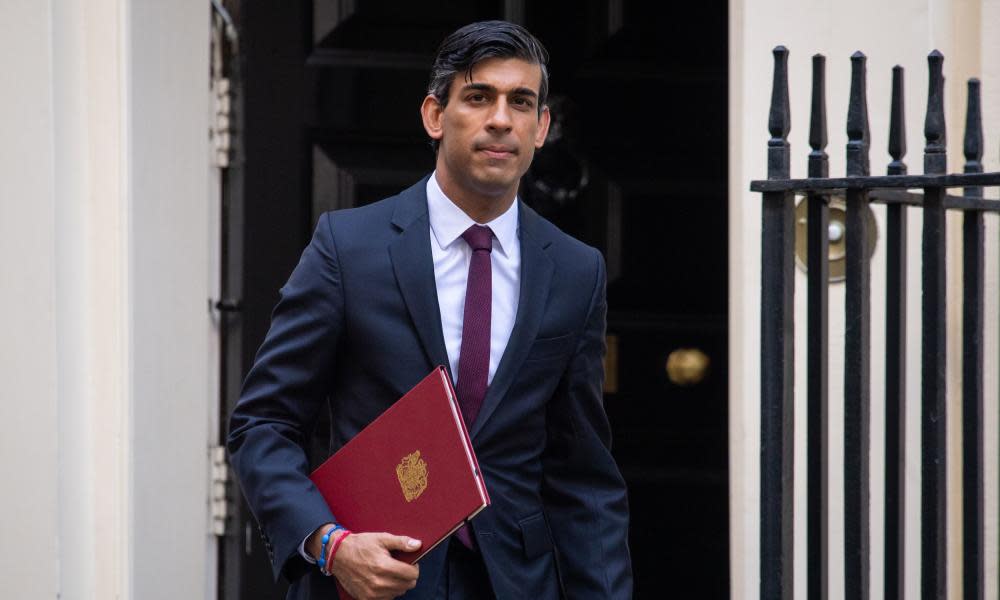The Guardian view on Rishi Sunak's jobs plan: playing for high stakes

As soon as Covid-19 cases began to rise again, forcing fresh public health controls and new restrictions on economic activity for another six months, another package of Treasury measures to protect jobs was inevitable. There is nothing unique about this. Similar packages have been introduced across Europe. The chancellor, Rishi Sunak, duly delivered one for Britain on Thursday. It bore little resemblance to the kind of measures he had been hoping to announce in his putative post-pandemic autumn budget. That budget has now been postponed until next year.
Thursday was instead the third Covid emergency budget of Mr Sunak’s dramatic chancellorship. The furlough scheme will close at the end of October. UK unemployment is already rising in anticipation and amid the recession, with Whitbread among the latest to announce big job cuts. So Mr Sunak either had to extend the furlough scheme, which is very expensive, or provide a robust new scheme. He has chosen to try the latter. But the package should have come sooner to minimise job losses.
The new jobs support scheme will replace the furlough from 1 November and last for six months. It requires workers to work at least a third of their hours to qualify for government support, capped at just under £700 per month. It is likely to stop mass unemployment from exploding uncontrollably in November when between 2-3 million people come off the furlough scheme. But it will mean many thousands of lost jobs all the same.
For the new short-time support scheme to function effectively, employers must have strong incentives to put employees on the new regime. The jobs retention bonus, introduced in July, helps. But the bonus scheme will end in January, while the short-time working scheme will run at least until April. They need to be brought into line. Nor is training and retraining well integrated into the new scheme. They are crucial too.
The short-time working support scheme will be significantly cheaper than the furlough scheme. It is easy to criticise it on those grounds, but the change should be cautiously welcomed, provided the new scheme is well managed. The state cannot sensibly guarantee to underwrite indefinitely every job that existed before the March lockdown. Short-time working is potentially a good and effective system, serving individual and national needs, providing that it offers proper pathways, including training, back to full-time work. It should be kept in place in the longer term, as it already is in Germany and elsewhere.
The success or failure of what Mr Sunak is trying to do is umbilically linked to the new Covid control measures. The better they control the virus, the sooner the jobs support schemes can be safely wound down. If the Covid controls are ineffective, however, some sectors will not be able to open up to take advantage. Testing, tracing and vaccine development, as well as prioritising the care sector, are all therefore utterly crucial economically as well as in health terms. None currently gives cause for confidence.
Mr Sunak has resisted targeted measures for some of the hardest-hit economic sectors. The argument that a special deal for one influential sector would trigger chaotic demands for similar deals elsewhere is a strong one. But Mr Sunak and his team should not be cowed by the cliche that governments should not try to “pick winners”. Some hard-hit sectors will again need special deals to keep them alive, including the arts and the railways. It became clear in the lockdown phase that tweaks and patches to some of the economic measures would be essential to longer-term prosperity. Mr Sunak was right to act then and he will have to do the same this time.
Politically, the chancellor had another success yesterday. The contrast between Mr Sunak’s ability to strike the right tone, express himself clearly, treat others with respect, and thus command confidence in his abilities, and Mr Johnson’s manifest inability to do the same on the public health front is now a yawning one. Mr Sunak took some big political risks on Thursday. It may all still end horribly for his currently high standing. But he had the political skills to carry the doubters this time. Plenty of Conservative MPs will have been right to notice the difference – and to reflect on it.


